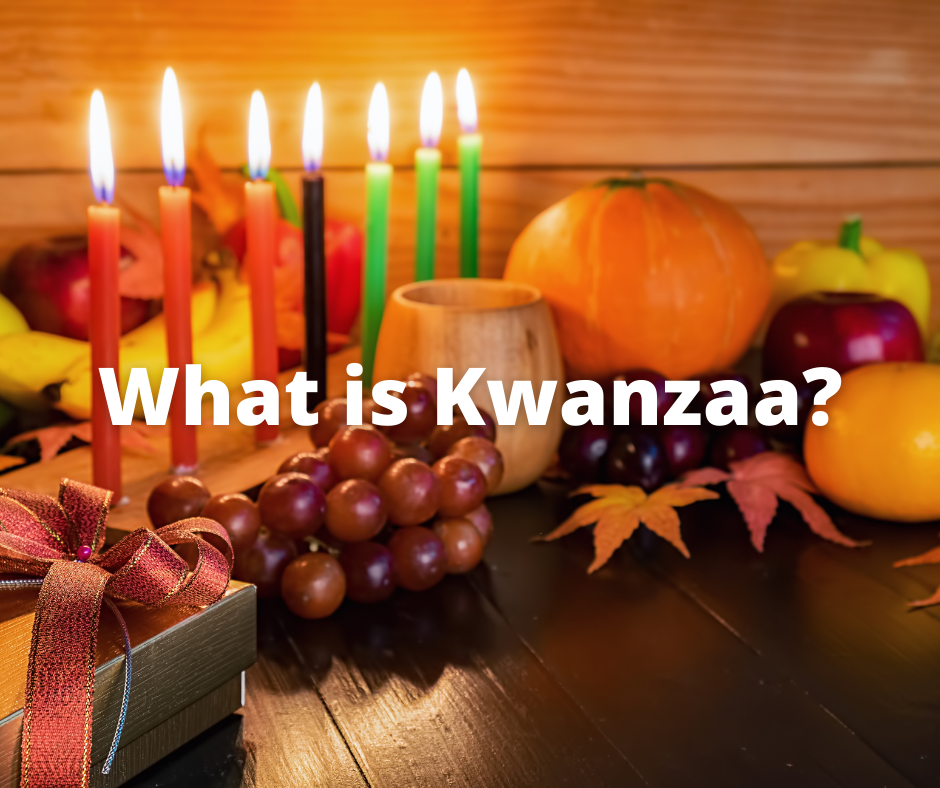
Holiday Spotlight: What is Kwanzaa?
Holiday Spotlight: What is Kwanzaa and how is it celebrated?
Kwanzaa is a holiday celebrated each December, from the 26th to January 1st. However, it may be surprising to know that Kwanzaa was only recently created in 1966 by Dr. Maulana Karenga; Professor and Chairman of Black Studies at California State University, Long Beach.
Kwanzaa history
Dr. Karenga wanted a way to form more community within the African American people after the Watts Riots ended. It wasn’t solely from those riots but the high tension in many of these communities that was a concern. In his research of African “first fruit” (known as the harvest) celebrations he combined parts of several celebrations from the Ashanti to the Zulu. Finally the holiday and name became Kwanaa which means “first fruits” in Swahili.
Celebrations
Typical celebrations include song, dance, African drums, storytelling and traditional food during the seven-night holiday. A child lights one candle on the Kinara (candleholder) then one of the seven principles is discussed. The principles known as the Nguzo Saba (seven principles in Swahili) and they’re values of African culture. Further, the values contribute to building and reinforcing community among African-Americans. There are also seven basic symbols that represent values and concepts of African culture. Finally, on December 31 an African feast is held called a Karamu.
Seven principles
Unity (Umoja): Streve for and maintain unity in the family, community, nation and race.
Self-determination (Kujichagulia): Define ourselves, name ourselves, create for ourselves, and speak for ourselves.
Collective Work and Responsibility (Ujima): Build and maintain our community together and make our brother’s and sister’s problems our problems and to solve them together.
Cooperative Economics (Ujamaa): Build and maintain our own stores, shops and other businesses and to profit from them together.
Purpose (Nia): Make our collective vocation the building and developing of our community in order to restore our people to their traditional greatness.
Creativity (Kuumba): Always do as much as we can, in the way we can, in order to leave our community more beautiful and beneficial than we inherited it.
Faith (Imani): Believe with all our heart in our people, our parents, our teachers, our leaders and the righteousness and victory of our struggle.
Seven Symbols
The principles (Nguzo Saba) are a set of ideas and each day of Kwanzaa focuses on a different one.
Mazao: Crops (fruits, nuts, and vegetables)
Symbolizes work and the basis of the holiday. It represents the historical foundation for Kwanzaa, the gathering of the people that is patterned after African harvest festivals in which joy, sharing, unity, and thanksgiving are the fruits of collective planning and work.
Mkeka: Place Mat
The mkeka, made from straw or cloth, comes directly from Africa and expresses history, culture, and tradition. Further, it symbolizes the historical and traditional foundation.
Vibunzi: Ear of Corn
The stalk of corn represents fertility and symbolizes that through the reproduction of children. One ear is vibunzi, and two or more ears are mihindi. Each ear symbolizes a child in the family. In contrast, if there aren’t children in the home, two ears on the mkeka because each person is responsible for the children of the community.
Mishumaa Saba: The Seven Candles
Candles are ceremonial objects with two primary purposes: to re-create symbolically the sun’s power and to provide light.
Kinara: The Candleholder
The kinara is the center of the Kwanzaa setting and represents the original stalk from which we came: our ancestry. The kinara can be any shape as long as the seven candles are separate and distinct.
Kikombe Cha Umoja: The Unity Cup
The kikombe cha umoja is a special cup to perform the libation (tambiko) which is a ritual during the Karamu feast on the sixth day of Kwanzaa. In many African societies they pour libation for the living dead whose souls stay with the earth they tilled. During the Karamu feast, family and guests pass the unity cup and drink from it to promote unity. Then, the eldest person present pours the libation, usually water, juice or wine, in the direction of the four winds to honor ancestors.
Zawadi: Gifts
Imani is on the seventh day of Kwanzaa and meaningful zawadi (gifts) to encourage growth, self-determination, achievement and success.
Kwanzaa is a unique holiday with heartfelt principles. This holiday isn’t a substitute for Christmas and many households celebrate both.
Whatever your own holiday traditions are, everyone here at Lifeline Connections wishes you healthy happy holidays!
